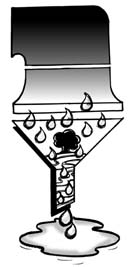Water from waste
 sewage and industrial wastewater have been treated and reused in India for agriculture for well over 100 years, and in industries for the last 30-40 years. In spite of this reuse, there is a great untapped potential if some other options are also considered.
sewage and industrial wastewater have been treated and reused in India for agriculture for well over 100 years, and in industries for the last 30-40 years. In spite of this reuse, there is a great untapped potential if some other options are also considered.
Groundwater recharge with freshwater, for instance, has been done in India but only on a limited scale in a few areas, where flowing water has been intercepted by use of checkdams, contour channels and ponds to divert the water underground. But the possibility of using treated wastewater instead of freshwater is yet to be considered. In many parts of India, the soil conditions are favourable for groundwater recharge of wastewater after some treatment and such reuse must be considered wherever feasible. Once the treated wastewater passes through the soil, natural purification processes makes the water as good as any natural freshwater. This can be beneficial for coastal regions, too, where groundwater is overexploited to support agricultural, commercial or industrial development. Drops in aquifer levels and seawater ingress are common problems. Groundwater recharge using wastewater can tide over the problem
Related Content
- Order of the National Green Tribunal in the matter of Futala lake pollution, Nagpur, Maharashtra, 05/06/2025
- Order of the National Green Tribunal regarding pollution of Godavari river, Telangana, 29/05/2025
- Order of the National Green Tribunal regarding dumping of waste in a canal in Chennai, Tamil Nadu, 29/05/2025
- Judgment of the National Green Tribunal regarding plywood factories operating in Yamuna Nagar, Haryana, 27/05/2025
- Order of the National Green Tribunal regarding discharge of wastewater by the municipality of Belpahar on a farmers land, Jharsuguda, Odisha, 15/05/2025
- Order of the National Green Tribunal regarding remedial actions to be taken for abatement of pollution of river Bhadar near Ahmedabad, Gujarat, 09/05/2025
